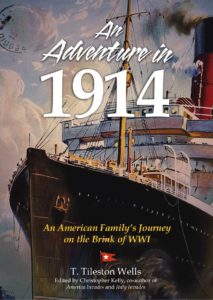CHRISTOPHER KELLY was born in Sacramento, California, and earned a bachelor’s degree in philosophy from University of California, Berkeley, in 1981. He worked for nearly 20 years in the television industry, mainly on the West coast, and was a director and partner in local television stations in Sacramento. He is the past chairman of Chyron Corporation. His current work, An Adventure in 1914: The True Story of an American Family’s Journey on the Brink of WWI (History Invasions Press, 2016) follows the lives of the Wells family at the outbreak of World War I.
 1. What inspired you to write this book?
1. What inspired you to write this book?
In 2014 I was on a book tour for the release of my first book, America Invades: The Controversial Story of How We’ve Invaded or Been Militarily Involved With Almost Every Country on Earth. My aunt Catherine gave me a leather-bound manuscript that had been written by my great-grandfather, Thomas Tileston Wells. The typed manuscript was called An Adventure in 1914 and concerned Wells and his family’s travels in Europe in the summer of 1914 just as World War I was breaking out. I was fascinated by this period in which the world was radically and violently transformed. In the summer of 2015, I retraced Wells’s steps, journeying through Europe by boat and train and taking photographs along the way. In Riva del Garda I stayed in the same hotel that Wells had stayed in over a hundred years before. Wells described Riva as being “one of the most beautiful places in the world.” I had to see it for myself. It was in Riva that Wells was briefly arrested by Austrian authorities, accused of being a Russian spy, and threatened with execution. Fortunately for Wells—and me—he managed to talk his way out of this predicament.
I edited his manuscript and added an introduction, epilogue, and extensive historical commentary. An Adventure in 1914 is a message in a bottle from a hundred years ago. Wells was an eyewitness to what I term “the greatest train wreck in history”—the start of World War I. Its tale of assassination, war, and financial crisis resonates eerily in our own time.
2. What’s your favorite underappreciated nonfiction work?
I love whenever possible to immerse myself in primary sources. One of the greatest nonfiction works on World War II is Iris Murdoch’s War in Val D’Orcia: An Italian War Diary, 1943–1944. It is an intimate portrait of a family trapped behind the lines in Mussolini’s Italy. It provides a kind of phenomenology of the war, covering topics from the effects of Allied bombing to the role of Italian partisans.
3. How did you become interested in military history?
When I was in high school I received a copy of John Keegan’s The Face of Battle as a Christmas present. The book represented a revolutionary new approach to military history. It was war from a soldier’s perspective, whether at Agincourt or Waterloo. Keegan put the reader into the trenches alongside the soldiers, making them really feel the shattering impact of war on men’s lives. Keegan never glorifies war but rather provides the most realistic and unsentimental account of the reality of battle. Secondly, Emil Ludwig’s biography of Napoleon launched me on a lifelong interest in the French emperor.
4. What is your favorite time period to write about?
I have always had a fascination with the Napoleonic era, including the War of 1812. The uniforms were colorful. The stage was worldwide. It was a time of revolution and tumult. At the heart of it was the character of Napoleon, who managed by force of will to dominate Europe for a decade. Not to mention personalities such as the Duke of Wellington and Admiral [Horatio] Nelson.
This period was exciting in North America as well. Thomas Jefferson purchased the Louisiana territory from Napoleon, doubling the size of the United States at the stroke of a pen. Lewis and Clark were dispatched to explore and claim a continent. The War of 1812 has many fascinating aspects, from the Star Spangled Banner to [Andrew] Jackson’s triumph at the Battle of New Orleans. My own ancestor, General Stephen Van Rensselaer, was a commander of the New York militia in an ill-fated invasion of Canada in the War of 1812.
5. Does writing energize you or exhaust you?
Writing is energizing but editing can be exhausting!
For me, writing is the best excuse to travel. Nothing compares to going and seeing things for yourself. Every time I visit a historic site it leads to modifications and improvements in my writing. I have been thrilled to visit places such as Pointe du Hoc in Normandy, the Bridge on the River Kwai in Thailand, and the Jackson Line near New Orleans. This past summer I visited the Mitchell Monument in central Oregon where six Americans were killed by a Japanese balloon bomb during World War II. I also enjoy the opportunity to take photographs, many of which are shared with my readers.
6. What’s next for you? What are you working on?
My coauthor, Stuart Laycock, and I have just finished writing America Invaded: A State by State Guide to Fighting on American Soil. It will be published later in 2017.
America Invaded is the sequel to America Invades. America Invaded is all about fighting in the 50 states and the District of Columbia. Our new book ranges from the first arrival of Europeans in the New World to terrorism in the 21st century. In addition to history this book will offer tourist information, making it a kind of passport for readers to begin their own exploration of our nation’s amazing military history. MHQ





